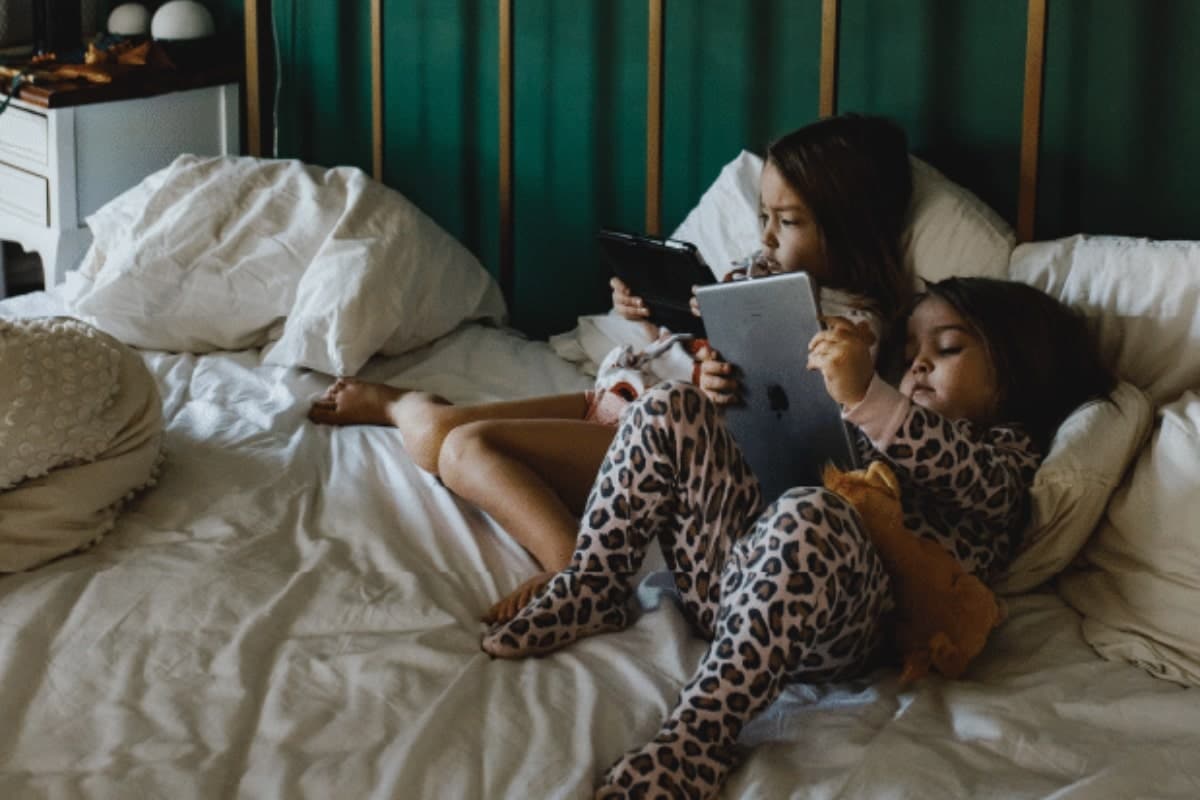Ph: Hanna Nakano
We know that screen time has become a daily part of parenting, whether we like it or not. And while it certainly has its advantages, we are beginning to learn that reducing your kids’ screen time can actually increase their sleep, and in turn, make your whole family a little healthier.
Your Rockin’ Blinks Crib Sheet:
- The link between screen time and lack of sleep affects children of all ages, from toddlers to adolescents.
- Whether you’re deciding to cut screens out completely or are just looking to set some boundaries, change is possible.
- Examine your bedtime routines and find ways to make small changes that can make a big difference.
- Communication and buy-in from all family members (including parents!) will help ease the transition.
Let’s be honest: none of us would have made it through the pandemic without screen time. Our screens are our main touchpoint to the outside world. They’re how we connect with far away grandparents, learn what’s going on in the news and, yes, sometimes even “babysit” our kids, so we can get a moment to ourselves. We totally get it. Zero judgement from us!
But as our life slowly transitions back to “normal”, you may find yourself hoping to reign in the amount of screen time your family employs. It makes sense, and it could do wonders for the amount of sleep your children get. Whether you’re deciding to cut screens out completely or are just looking to set some boundaries, change is possible. And with the right tips, it can actually be pretty simple.
Why reduce your kids´ screen time?
Sleep researchers agree that screen time could be bad for sleep. Blue light from screens is stimulating, addictive and even breaks up your circadian rhythm. But to understand how pervasive an issue insufficient sleep because of screens really is, you have to look at the numbers.
The link between screen time and lack of sleep affects children of all ages, from toddlers to adolescents (and adults too!). As many as 30-percent of toddlers are underslept because of their screen time use and that percentage just keeps climbing as children get older. Some research even indicates that for every hour of screen time watched in a day, young children lose nearly 30 minutes of sleep.
“Screens are an undeniable part of our reality, but we still need to remember that the use of electronic devices requires boundaries, especially to protect one of the most important processes to keep us healthy: sleep,” says Lola Sanchez Liste, mother of two and the founder of Rockin’BLINKS. As a child sleep coach who is certified by the Family Sleep Institute, Lola says screen time has been a universal challenge for so many of the families she is working with to create sleep plans, especially during the pandemic. Babies in front of phones during night wakings, toddlers falling asleep watching the tablet at 11pm, teenagers scrolling on their phones at 2am — Lola says she’s heard it all. And it’s all understandable since parents are totally burnt out after a year-plus of a worldwide pandemic.
Don’t worry, she says, you don’t have to cut screens out of your life completely! But setting limits on screen use will go a long way. Here are her expert tips to help your family ease away from screens and get the sleep you deserve.
Tips for Reducing Screen Time
- Try to avoid screens first thing in the morning.
For younger children, consider cutting screen time as their first morning activity. It can be so tempting to put early risers in front of the screen, but this actually may be reinforcing their early wake up pattern because they are excited to get up and watch television or play on their tablet. Instead, try using the mornings as a great time to capitalize on the portion of the day where they are more alert and have a longer attention span for more interesting activities. For school-aged children, you may want to consider a no-screen-time rule before “online classes” start, and leave morning screen time for weekends. - Create a new bedtime routine.
If you’re using screens to help your children fall asleep, you’re not alone. Almost 50% of parents say watching TV at night helps their toddler or young child wind down at night. We see this is a great starting point for limiting screen usage. Try introducing a new bedtime routine that doesn’t rely on screens, like a warm bath and a book. It may feel like more work at first, but the additional sleep your child (and you!) will get as a result is more than worth it - Set a time to turn off screens.
There’s actual science behind why too much screen time disrupts your sleep and a lot of it has to do with blue light and your circadian rhythm. The blue light your screens emit disrupts your body’s natural sleep rhythm, making it hard to go to sleep even though you may be tired. We suggest setting a firm time for the family to turn off all screens; ideally this should be at least one hour before bedtime. For younger children, consider no screens after 5 p.m. - No tech in the bedroom.
If you’re having trouble falling asleep, you’ll probably reach for your phone and do some mindless scrolling. Your kids feel that too, but that late night device use actually keeps them awake longer. Try removing the temptation of screen use in your child’s bedroom (especially teenagers) by keeping all that tech in a different room. Tablets, phones and video games can be left in a different room during the night time hours. - Make your kids a part of the conversation.
If your children are old enough, the new rules around screen time can be discussed in a family meeting. And it’s important to let your children know that parents have to abide by these rules, as well. If your family decides no screens after dinner, but parents are still using their phone it might feel confusing or unfair. We want to send the message that screens are not healthy for sleep and that includes parents’ sleep, too. - Be consistent.
Once you make a decision on screen time, stay consistent. If you want your children to follow the new rules, you have to consistently enforce them — this is especially important to avoid confusion or leeway as you transition to a new set of rules. Be prepared for resistance, protest and angry faces. Not all of our parenting decisions are well-received by our children. Stay calm, acknowledge that the change is hard, and remain consistent with your new boundaries. - Know you’re doing the right thing.
Whatever your decision is as a parent, whether to limit or eliminate screen time completely, know that you are doing the right thing for your family. Feel conviction in your decision and have the confidence to follow through. This advice translates into many areas of your parenting journey.
Good sleep is essential for a happy healthy childhood and life. Book a consultation with us now!
Subscribe to our Newsletter and get the latest in sales, sleep information and more








